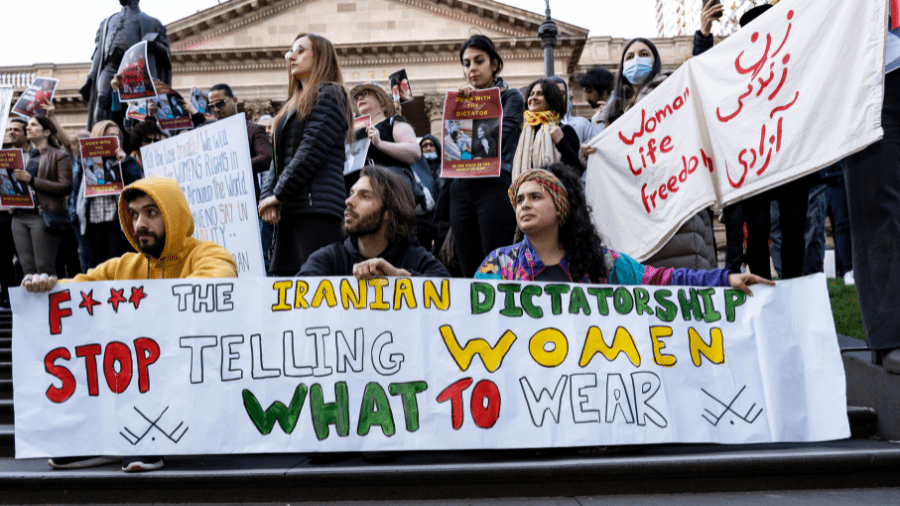This article originally appeared in the National Post.
By Kaveh Shahrooz, September 27, 2022
In recent months, the global war against dictatorship has been fought most fiercely in Ukraine, where the people have bravely resisted Russian occupation and liberated large swaths of their territory. In the past week, however, the beleaguered women of Iran opened a second front in this war. The only meaningful victory on this front will come with the toppling of the theocracy that has brutalized Iran for over four decades.
The spark that lit the recent Iranian protests — which increasingly displays all the hallmarks of a revolution — was the murder of a 22-year-old Kurdish-Iranian woman named Mahsa Amini at the hands of Iran’s “morality police.” They had detained her because her hijab did not meet the Iranian regime’s strict standards.
The protests that have gripped the country after Amini’s death are the stuff of nightmares for the geriatric clerics and military thugs that have run Iran since 1979. Unlike in previous protests where the people chanted for economic relief or fair elections, the message from the streets has been clear: “Death to the dictator.”
In that slogan lies the essence of where things stand with Iran’s regime: it has proven itself both a cruel dictatorship, and one so rigid that nothing but complete eradication — a metaphorical death — can fix.
The cruelty of the regime is known to anyone with even a passing familiarity with the past 40 years of Iranian history. Ever since its founding, the Islamic Republic has jailed, tortured and executed wave after wave of political activists, ethnic minorities, artists, journalists and labour unionists.
It has, as the case of Amini so clearly demonstrates, established a gender apartheid state where women are afforded half the worth of men. It has severely discriminated against ethnic and religious minorities. It has taken hostages, shot civilian airliners and planted bombs abroad. That is to say nothing of the violent proxies it has funded and the nuclear weapons it has attempted to acquire at the cost of international isolation and economic ruin.
There is perhaps no better symbol of the system’s cruelty than its current president, Ebrahim Raisi, a man who by all accounts was directly involved in sending approximately 5,000 political prisoners to the gallows in a massacre in 1988.
In the late 1990s, there was a glimmer of hope that the Islamists might be willing to slowly reform their ways. Young Iranians used the system’s very limited and tightly controlled electoral mechanisms to place “reformists” in key positions. However, those men proved themselves to be both incompetent and fundamentally loyal to the theocratic system. Every demand for reform was either not pursued or stymied through threats, imprisonment or outright vote-rigging.
The brutality with which the “Iranian Green Movement” — a protest movement pushing for fair elections following the 2009 presidential election — was crushed and the ongoing detention of its leaders, men who had loyally served the upper echelons of the theocratic system for decades, put the final nail in the coffin of the reform experiment.
The idea of an evolution in the Islamic Republic no longer has any currency. All that remains now is the hope that either the current revolutionary protests, or a future one, overthrows the ruling clerical-military alliance and replaces it with something more democratic and humane.
To succeed, such a movement needs international support in the form of diplomatic pressure, technological assistance and sustained media attention. To facilitate those things, it needs a western consensus that the regime in Tehran is illegitimate in the eyes of its own population and must go. Alas, that consensus has so far been lacking.
For many western politicians and civil society leaders, the term “regime change” still brings back dark memories of America’s misadventure in Iraq, which is why they have been slow to accept that it is precisely what is needed in Iran.
But they are mistaken in applying the Iraq lens to Iran. Unlike when the United States toppled Saddam Hussein’s regime in Iraq, Iran’s regime change movement is entirely homegrown and is not seeking foreign military intervention. All it seeks is international attention and solidarity.
That solidarity with Iranians’ desire for regime change is a small price to pay for over 80 million people to have a better life and for fewer conflicts in the region.
It is a small price to pay to ensure that no woman is ever treated like Mahsa Amini again.
Kaveh Shahrooz is a lawyer and a Senior Fellow at Canada’s Macdonald-Laurier Institute.






